Obituary: Tam Dalyell
- Published
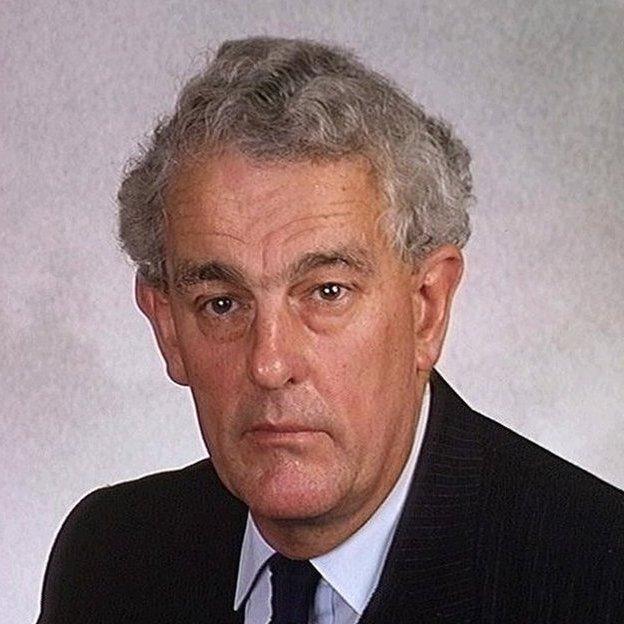
Tam Dalyell was a political contradiction, an aristocratic Old Etonian who became a socialist politician.
It was he who articulated what became known as the West Lothian Question, which festered at the heart of Scotland's relationship with Westminster.
A former Conservative activist, he became a thorn in the side of the Thatcher government.
But he won admiration from across the political spectrum as an honourable and principled member of parliament.
Thomas Dalyell Loch was born in Edinburgh on 9 August 1932.
His father Gordon Loch, a civil servant, adopted his wife Nora's maiden name in 1938.
It was through his mother that Dalyell later inherited the Dalyell baronetcy, although he never used the title.
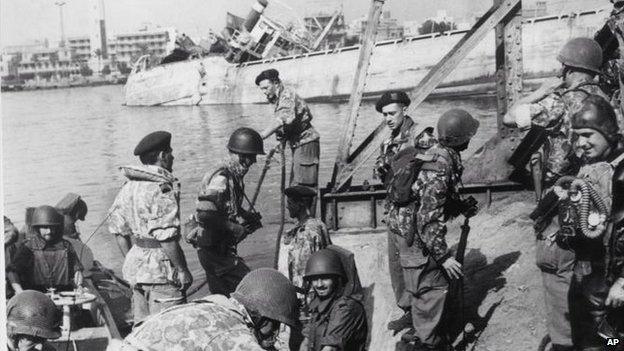
The Suez crisis made him an opponent of British military intervention
He went to Eton before doing his National Service as a trooper with the Royal Scots Greys, having failed his officer training.
After he was demobbed, he went to Cambridge where he was chairman of the University Conservative Association.
It was while working as a teacher that he experienced a political conversion, brought about by the Suez Crisis in 1956.
The debacle, in which Britain, together with Israel and France, unsuccessfully attempted to gain control of the Suez Canal, made a deep impression on him
Independent stance
Not only did he join the Labour Party, but the aborted invasion made him a committed opponent of future British military involvement overseas.
In 1962, he won the seat of West Lothian in a by-election, fighting off a strong challenge from a future SNP leader, William Wolfe.
Less than two years after he entered parliament, Dalyell was appointed parliamentary private secretary to Dick Crossman, then Minister for Local Government.
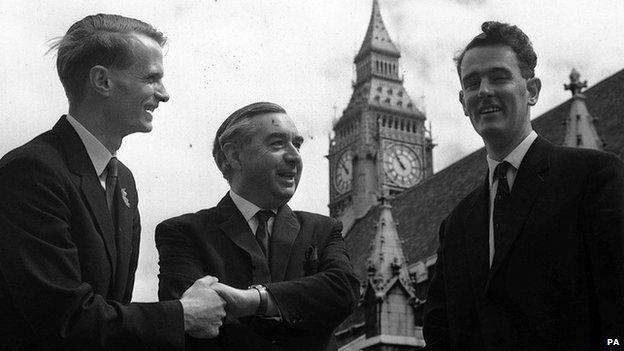
Dalyell (r) arrived at Westminster in 1962 as the newly elected member for West Lothian
The position of PPS was seen as the first step to a ministerial career, but Dalyell's independent stance on issues irritated the party establishment.
That irritation turned to anger in 1967 when he was heavily censured for leaking minutes of a select committee meeting about the Porton Down biological and chemical warfare establishment to the Observer newspaper.
Dalyell claimed he thought the minutes were in the public domain but he did not escape a public dressing-down by the Speaker.
In a parliamentary debate on devolution in 1977, Dalyell first proposed what would become known as the West Lothian Question.
Persistent
A vocal opponent of Scottish devolution, Dalyell contrasted the town of Blackburn in his own constituency, and Blackburn in Lancashire.
"For how long," he asked, "will English constituencies and English Honourable Members tolerate at least 119 Honourable Members from Scotland, Wales and Northern Ireland exercising an important and often decisive effect on English politics?"
It was Enoch Powell who coined the term West Lothian Question, in his response to Dalyell's speech.
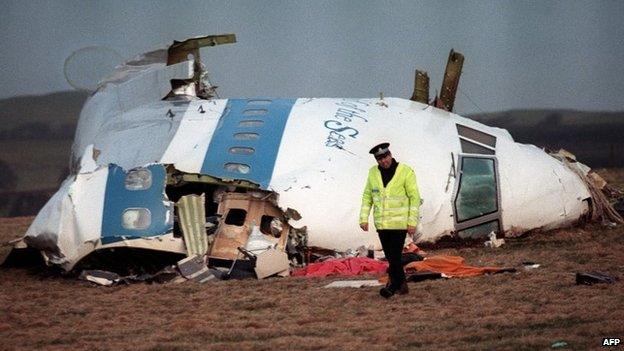
He fought to uncover the truth about the Lockerbie bombing
When Margaret Thatcher came to power in 1979 she found Dalyell a persistent critic of her policies.
He supported the Troops Out movement in Northern Ireland and attacked the prime minister's proposed boycott of the Moscow Olympics.
But it was the Falklands War that raised his public profile. He described the conflict as "like two bald men fighting over a comb," quoting the Argentinian writer Jorge Luis Borges.
He strongly condemned the decision to sink the Argentine cruiser, General Belgrano, insisting the vessel had been steering away from the conflict when torpedoed by a British submarine.
Intemperate
His political opponents called him Daft Tam, ignoring the methodical and painstaking preparation he put into sourcing the facts to back up his arguments.
He was no slave to parliamentary protocol and was suspended from the House on numerous occasions, twice for calling Mrs Thatcher "a liar" over the Falklands campaign.
"She is a bounder, a liar, a deceiver, a cheat, a crook and a disgrace to the House of Commons," was one notable contribution during a 1987 debate.
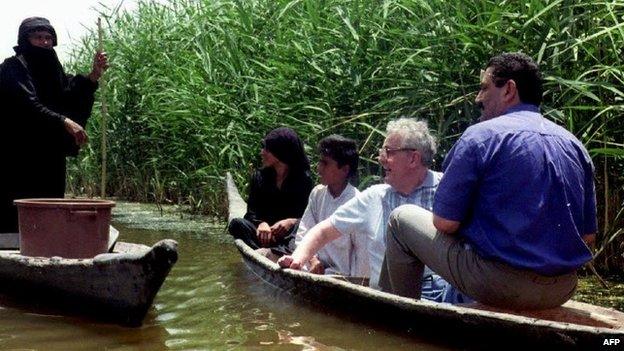
Dalyell made a trip to Iraq, touring the country's marshes
However, some felt that his intemperate language did nothing to win him support.
Former Conservative MP and later political commentator, Matthew Parris said that "this element of personal vendetta seriously weakens his case".
Dalyell was persistent in trying to uncover the truth about the Lockerbie bombing and consistently said he did not believe Libyan leader Colonel Gadaffi was responsible for the outrage.
He was, predictably, bitterly opposed to the Gulf War, "Kuwait is the 19th bloody state of Iraq," and went to Baghdad in 1994 to negotiate with Iraqi foreign minister Tariq Aziz.
Less relaxed
The election of a Labour government under Tony Blair in 1997 failed to deter Dalyell from speaking his mind.
In 1999, he decided that he would no longer vote at Westminster on purely English issues, defying a number of three-line whips.
He was one of 25 MPs who opposed military action in Kosovo. "I am one of a dwindling number of MPs who have actually worn the Queen's uniform," he said.
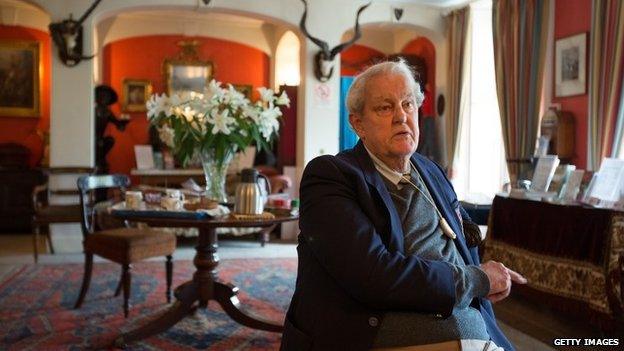
He continued to live in the ancestral home
"Perhaps we are a bit less relaxed about unleashing war than those who have never been in a military situation."
He had little time for the New Labour project, describing Tony Blair as the worst of the eight prime ministers who had held power while he was a parliamentarian.
In 2001, he became Father of the House, the longest continuous serving MP, using his position to attack the US led invasion of Iraq.
"These are the thought processes of fantasist Americans who want to control the world," he said. "I am appalled that a British Labour prime minister should have got into bed with a crew which has this moral standing."
Dalyell stood down from the House of Commons in 2005, after serving 43 years as an MP, first for West Lothian, then, from 1983, the redrawn constituency of Linlithgow.
Behind Tam Dalyell's somewhat shambling and eccentric demeanour was a keen analytical brain and a passion for meticulous research.
Unrepentant about his dogged approach, he claimed that "you must not be afraid to be thought a bore".
He was that rare thing among politicians, a man who stuck to his principles, regardless of how unpopular it made him.